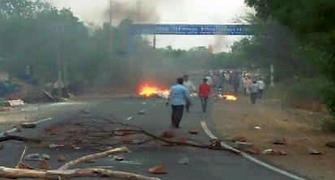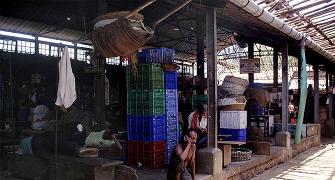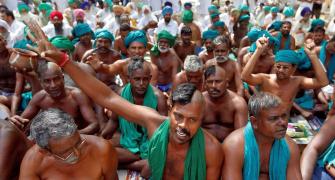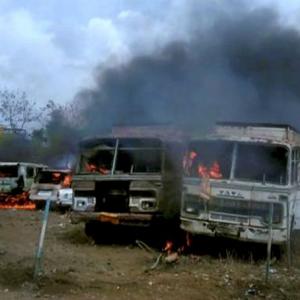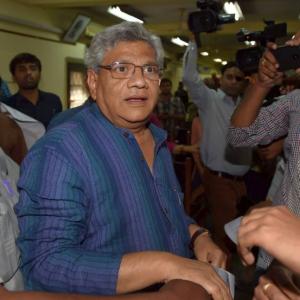Farmers said a big reason for the anger was the sudden stopping of wheat procurement by the state government in some places, which had caused the prices to dip below the minimum support price.
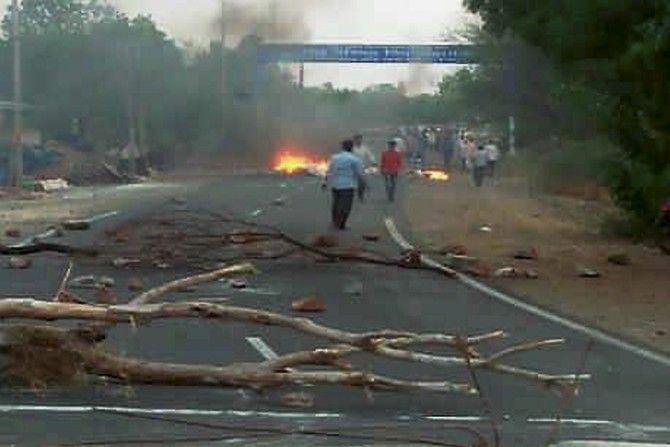
An eerie silence prevailed on Wednesday on the mostly deserted fields in Madhya Pradesh’s soybean- and wheat-growing belt of Malwa even as violence continued in the state, where five people were killed in police firing on Tuesday.
In Mandsaur, where the firing had taken place, violence broke out at several places as agitators torched a warehouse and a few vehicles despite curfew. Protestors also slapped the district magistrate. All four-wheelers, including those belonging to senior Bharatiya Janata Party and Congress leaders, were barred from entering Mandsaur via the neighbouring districts of Neemuch and Ratlam.
As a precautionary measure, internet services have been stopped in Neemuch, Mandsaur, Ratlam, and Ujjain for the last two days.
Meanwhile, the Prime Minister's Office has sought a report on the matter from the Madhya Pradesh government. Also the State Human Rights Commission has sought information from the Mandsaur district collector on the farmers' protest and subsequent violence.
The ongoing farmers’ agitation has kept the state administration on tenterhooks across the state. Shops and establishments in the districts of Neemuch, Mandsaur, Ratlam, Ujjain, and parts of Indore were shut in response to the daylong bandh called by the Congress and other opposition parties against the police firing.
Bhopal, the state capital, too remained highly tense with police pickets at several spots and the district administration instructing police stations to enhance security after agitators threatened to storm them in some parts of the state.
A bus was torched on the Indore-Bhopal highway in the evening while violence was reported from Dewas and Sonkach the entire day.
April-June is the lean agriculture period in the Malwa-Nimad belt, where the wheat crop has been harvested and the soybean crop is yet to be sown. The belt, known for its highly fertile alluvial black soil, is considered to be the richest part of Madhya Pradesh. Villages are dotted with farm machine repair shops, big educational institutions, wide roads, and modern procurement centres.
“We don’t want to speak about Tuesday’s incident as the situation is tense and we don’t even know who are the people behind this,” said Ram Avatar, 50, sitting with his friends at a roadside tea joint.
Some farmers said a big reason for the anger was the sudden stopping of wheat procurement by the state government in some places, which had caused the prices to dip below the minimum support price.
Madhya Pradesh had targeted procuring more than eight million tonnes of wheat but might end up doing not more than six-seven million tonnes because fewer farmers have registered for the online procurement system.
The state government, meanwhile, decided to come up with the farmer debt solution scheme. The scheme would be similar to a loan waiver scheme, Archana Chitnis, minister in charge of Mandsaur, said in Bhopal.
The state government has decided to buy moong directly from farmers from June 10 and also urad at the minimum support price. It has also decided to set up a price stabilisation fund of Rs 1,000 crore.
The political blame game continued between the Congress and BJP, with the ruling party publicising videos and messages of Congress leaders allegedly instigating agitators to burn down police stations and a railway property. The Congress blamed the state administration for being indifferent to the farmers’ plight.
In some wholesale markets like Harda and Hoshangabad, the situation was returning to normal. Farmers said they would sell vegetables directly to consumers instead of routing them through middlemen.
Madhya Pradesh Chief Minister Shivraj Singh Chouhan, in a presentation to the Prime Minister at a Niti Aayog meeting last month, had claimed that farmers’ income in his state had risen over 32 per cent in the financial year 2016-17 as compared to 2015-16.


